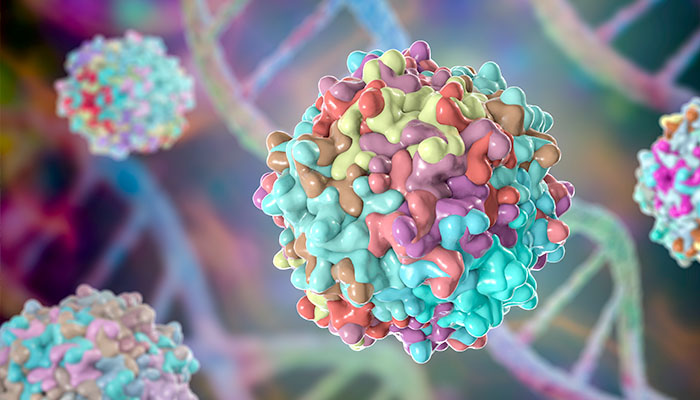HOW CAN WE HELP YOU? Call 1-800-TRY-CHOP
In This Section
Research Shows Multiyear Factor VIII Expression After Hemophilia A Gene Therapy

A multisite, international phase 1/2 clinical trial demonstrated that a one-time infusion of an investigational adeno-associated viral vector for hepatocyte expression of factor VIII reduced bleeding episodes and enabled some participants with hemophilia A to cease prophylactic clotting factor concentrates.
By droseyb [at] chop.edu (Barbara Drosey)
A combination of the prolific cell and gene therapy work at Children's Hospital of Philadelphia, a leader in gene therapy delivered by adeno-associated viral (AAV) vectors, and the institution's large hemophilia population have produced the novel opportunity to create a potentially curative one-time treatment.
CHOP has more than two decades of experience in the development of therapeutics for the treatment of hemophilia, an inherited blood disorder that mostly affects males in which the proteins, or clotting factors, that prevent excessive bleeding are reduced or missing altogether. Patients with hemophilia currently rely on regular clotting factor injections to prevent bleeding episodes from occurring.
New results from a multisite, international phase 1/2 clinical trial demonstrated that a one-time infusion of an investigational AAV vector for hepatocyte expression of factor VIII, the coagulation protein deficient in patients with hemophilia A, successfully reduced bleeding episodes and enabled some participants with hemophilia A to cease prophylactic clotting factor concentrates.
"The most remarkable finding of our work is that once people reached steady-state levels about a year post vector administration, they were stable thereafter — this represents a marked deviation from prior work in which investigators noted an, on average, loss of approximately half of factor VIII expression within two years post vector," said first and corresponding author Lindsey George, MD, director of Clinical In Vivo Gene Therapy and an attending physician in the division of Hematology at CHOP.
Previous research appeared to support the gradual loss of gene expression as a universally accepted outcome of current approaches of AAV gene therapy for hemophilia. Patients who receive AAV gene therapy develop neutralizing antibodies, similar to the antibody response when receiving a vaccine. This renders gene therapy a one-time attempt— if it isn't effective, the patient cannot receive a second AAV vector infusion.
Durability of Expression
The current study's results appeared in the Nov. 18 issue of the New England Journal of Medicine. Eighteen study participants with hemophilia A received a one-time gene therapy infusion and achieved an average factor level of 10 percent that was sufficient to nearly ameliorate bleeding. Most participants received steroids against an immune response and two participants lost all expression due to immune response to the AAV vector's capsid, its protective protein shell, that did not resolve with immunosuppression.
Among the 16 trial participants who maintained factor VIII expression, 12 have been followed for more than two years. They have maintained stable factor VIII expression, no longer experience spontaneous bleeding events, and were able to cease multiple weekly intravenous clotting factor infusions. This durability of expression is a significant difference from previous research, in which participants lost expression within two years of receiving the AAV vector.
"The most important and salient observation for this clinical trial is essentially durability of expression — that once people have steady state expression of factor VIII, the protein deficient in hemophilia A, the levels are relatively stable over time," Dr. George said. "Patients can, indeed, maintain a stable expression over time with our current approaches for hemophilia A gene therapy."
Improved Quality of Life for Patients
Dr. George noted, anecdotally, that many of the study participants who experienced sustained factor VIII expression were far more active than they had been in the past and reported improved quality of life, as well as being significantly less worried about their future.
"The treatment essentially de-medicalized their care," Dr. George said. "In fact, we remind them that they still need to have regular visits with their hematologist."
Dr. George recommends the study participants continue to avoid contact sports and advises them to keep factor concentrate treatment products on hand, in case of head trauma, the most common cause of morbidity for individuals with hemophilia.
"But otherwise, these men are essentially liberated from their condition," Dr. George said. "Seeing what these therapies can actually mean for people and their families makes having a role in a clinical trial especially rewarding."
Participants will be closely monitored for continued assessment of safety, efficacy, and confirmation of ongoing durable expression. Future research is underway to determine treatment regimens that achieve sustained, safe, and stable expression in all study participants, regardless of immune response.
Ideal Therapeutic Target
Hemophilia is a suitable target for AAV-based therapeutics, notably because researchers can easily measure the function of the protein by a simple blood test and there are well defined clinical correlates with factor activity such that assist in predicting patient outcomes, Dr. George explained.
"Our longstanding history of hemophilia gene therapy research at the Children's Hospital of Philadelphia provided the foundation for successful clinical trials in hemophilia B, and now hemophilia A gene therapy. These successes support the ultimate goal of hemophilia gene therapy to alter the paradigm of hemophilia care may soon be realized." said Dr. George, who also is a faculty member in the department of Pediatrics in the Perelman School of Medicine at the University of Pennsylvania and the Raymond G. Perelman Center for Cellular and Molecular Therapeutics at CHOP.
Dr. George collaborated with CHOP researchers and colleagues at Harvard Medical School, University of Sydney in Australia, University of Pittsburgh, Penn State Hershey Medical Center, Mississippi Center for Advanced Medicine, Boston Children's Hospital, Oregon Health and Science University, and Spark Therapeutics. Spark Therapeutics funded the trial, with additional support from the National Institutes of Health. Spark Therapeutics originated from CHOP in 2013, but the institution no longer has ownership or equity in the company.
Learn more in the CHOP press release.